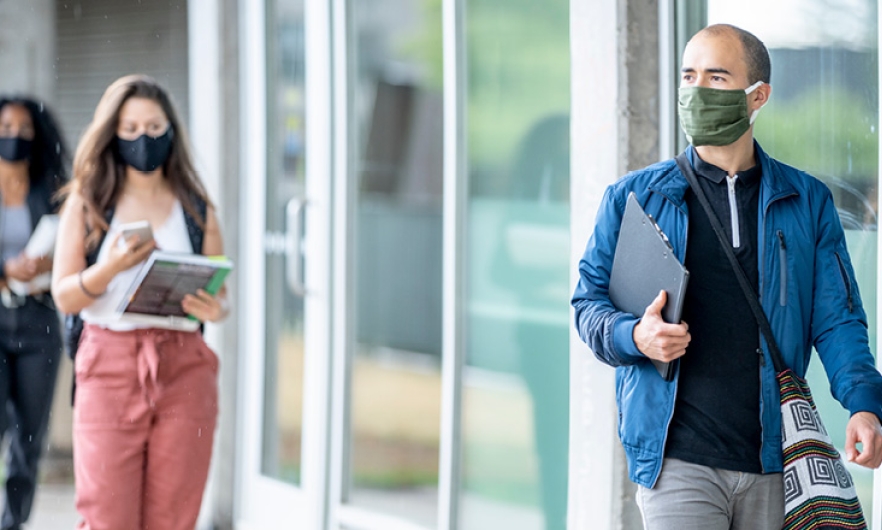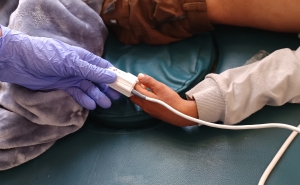COVID-19 and College Campuses: What You Need to Know

Limiting the risk of COVID-19 transmission while engaging in academic and residential college life
While many colleges and universities have shifted to online learning, some will convene students on site this fall or have a hybrid of virtual and onsite learning.
Schools should have policies in place—and clearly communicate them to students, parents, faculty, and staff—but there are still things individuals can do to limit the risk of COVID-19 transmission.
Drawing from the COVID-19 Planning Guide and Self-Assessment for Higher Education (and other sources as noted below), here’s what you should know:
What should I do to prepare?
Make sure you know and understand your college or university’s policies, especially:
- How you will be contacted if you may have been exposed
- Who you should contact and what you should do if you think you have been exposed or have COVID-19
- Who you should contact to ask questions about symptoms, quarantine, and isolation
- Where you can go for testing and treatment
- What you can expect if a significant outbreak is reported on campus
If you are attending school in another city or state, learn and comply with that area’s mandates for masks and social distancing. Keep in mind that states may have different policies in place and some have penalties for noncompliance. It would also be helpful to have a travel and quarantine plan in place in the event that any jurisdiction reimplement stay-at-home orders.
How many masks should I buy and which types are best? How do you clean them?
Homemade masks or cloth face coverings can be effective in stemming the spread of COVID-19. Masks should be washed after each use, so having a minimum of two to three is helpful.
For those without easy access to laundry facilities, storing homemade masks in a paper bag for at least two days between uses can suffice.
SOURCE: Understanding Changing Guidance on Mask Use
Do I need gloves?
Good hand hygiene can help prevent the spread of COVID-19. This includes washing your hands regularly with soap and water or using hand sanitizer. If you are maintaining good hand hygiene, gloves are not necessary.
SOURCE: Dr. Jennifer Nuzzo from the Center for Health Security Answers More COVID-19 Questions (podcast)
What are the symptoms of COVID-19 and what should I do if I start to experience them?
People with COVID-19 experience a wide range of symptoms that can vary from mild to severe. These can include:
- Fever or chills
- Cough
- Shortness of breath or difficulty breathing
- Fatigue
- Muscle or body aches
- Headache
- New loss of taste or smell
- Sore throat
- Congestion or runny nose
- Nausea or vomiting
- Diarrhea
This list does not include all possible symptoms. If you are ill, it’s important to contact your primary care provider or someone at your university health system to determine if you need a COVID-19 test.
SOURCE: CDC
Do I have to contact my university or college if I experience any of these symptoms?
If you are experiencing any of these symptoms and you have been exposed to COVID-19, it’s crucial to contact your university or college right away.
Even if you’re not sure whether you’ve been exposed, it’s still important to contact a health official if you’re experiencing any of these symptoms to determine if further follow-up is needed.
What does it mean to be “exposed” to COVID-19?
Exposure circumstances can include:
- Being in close contact—within six feet for 15 minutes or longer—with someone who tests positive for COVID-19
- Attending in-person classes or participating in activities with an individual who tests positive for COVID-19
- Sharing a bedroom, bathroom, kitchen, or common living space with an individual who tests positive for COVID-19
When should I consider quarantining myself?
Anytime you think you may have been exposed to COVID-19, you should quarantine and monitor yourself for symptoms for 14 days. If you are able to get a COVID-19 test during this time, you should do so. Make sure your provider knows that you may have been exposed so they can instruct you on safe ways to access a test.
What’s the difference between quarantine and isolation?
Quarantine is for people who may have been exposed. This involves restricting movement, such as staying at home or in your dorm room, and limiting contact with others as much as possible.
Isolation is for people who are sick.
Many institutions are planning to designate particular spaces on or off campus for isolating students and others who have been exposed. It is important to understand your college’s isolation and quarantine policies before going to campus so you know the protocols and options available.
SOURCE: Eric Toner, Healthcare Preparedness Expert, Answers Your COVID-19 Questions (podcast)
How can I quarantine or isolate in a dormitory or other type of shared housing?
It’s important to let your college or university know if you have been exposed to COVID-19 so that they can advise you on how to safely self-quarantine on campus. In the meantime, avoid contact with others as much as possible and wear a mask in shared spaces.
Many institutions are planning to designate particular spaces on or off campus for isolating students and others who have been exposed.
It is important to understand your college’s policies around isolation and quarantine before coming to campus so you know the protocols and options available.
If I've already had COVID-19, do I have to quarantine and get tested if I am exposed again?
Although having COVID-19 may offer some level of protection against future infections, it’s still unknown how long this protective factor may last. It’s important to follow your college or university’s guidelines for known exposure such as quarantine and testing.
What’s the safest way to catch up with my friends?
Physical distance doesn’t have to mean social and emotional distance. The best way to interact safely with others is outdoors, remaining six feet apart, and wearing masks. Students should avoid hanging out indoors and/or in large groups. Colleges and universities may have specific guidelines for the number of people who can gather together.
What else can I do to prepare for going back to school?
Get your flu shot as soon as one is available.
It is always important to get a flu shot, but there is even more urgency this year to avoid having a flu outbreak at the same time as COVID-19.
Be prepared for the additional health and safety precautions and the different experience you will have when returning to campus. While it may not be the “normal” college experience, you can still find safe ways to have fun, make memories, and experience college life.
Also remember everyone has their part to play in controlling this virus. We must work together and do it all—wear masks, practice physical distance, stay home if unwell, and clean our hands regularly—to turn this pandemic around.
SOURCE: The Importance of the Flu Vaccine During the COVID-19 Pandemic (podcast)
SOURCE: WHO Director-General’s opening remarks at the media briefing on COVID-19 - 3 August 2020
This content was reviewed by Lucia Mullen, a senior analyst at the Center for Health Security.





